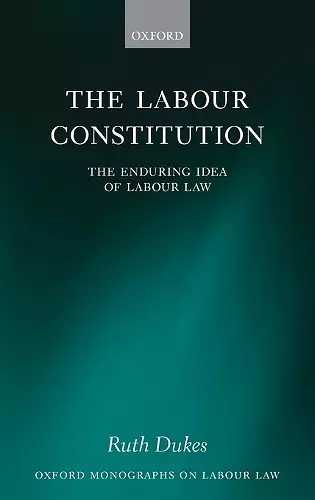The Labour Constitution
The Enduring Idea of Labour Law
Format:Hardback
Publisher:Oxford University Press
Published:16th Oct '14
Currently unavailable, and unfortunately no date known when it will be back
This hardback is available in another edition too:
- Paperback£49.49was £49.49(9780198821762)

Runner-up of the SLSA Socio-Legal Theory and History Prize 2016
This book examines different approaches to the study of labour law, comparing traditional with more market-focussed approaches. It argues that the idea of the labour constitution continues to offer a useful framework for scholarly analysis, emphasising the critical nature of the link between democracy and the protection of workers' interests.Exploring different approaches to the study of labour law, this book examines different ways of conceiving of the subject and of describing, analysing, and criticizing current legislation and policy in the field. In particular, it assesses the validity of the suggestion that 'old ways' of thinking about the subject have become outdated. Detailed consideration is given to two such old ways: the idea of the labour constitution, developed by Hugo Sinzheimer in the early years of the Weimar Republic, and the principle of collective laissez-faire, elaborated by Otto Kahn-Freund in the 1950s. It asks whether, and how, these ideas could be abstracted from the political, economic, and social contexts within which they were developed so that they might still usefully be applied to the study of labour law. The central argument of this book is that the labour constitution can be developed so as to provide an 'enduring idea of labour law', and this is constructed against a critique of modern arguments which favour reorienting labour law to align more closely with the functioning of labour markets. As compared with the posited 'law of the labour market', the labour constitution highlights the inherently political nature of labour laws and institutions, as well as their economic functions. It provides a framework for analysing labour laws, labour markets, and labour market institutions, which does not limit the capacity of scholarship in the field to retain its critical edge. It focuses our attentions on important questions, and important fields of enquiry: on questions, not least, of the consequences for workers of the narrowing and disappearance of spaces for democratic deliberation and democratic decision-making as markets continue to expand.
Dukes presents a convincing argument which outlines the attractiveness of the labour constitution as an idea... For anyone interested in the question of what is labour law this book is highly recommended reading and certainly makes a valuable contribution to the existing literature. * Rebecca Zahn, Historical Studies in Industrial Relations *
A brave book that retrieves and defends the goals of emancipation and democracy against contemporary theorising that accepts the market as the measure of and mechanism for achieving workplace and economic justice... An important contribution to debates about the crisis of labour law. * Eric Tucker, Modern Law Review *
Thoughtful and thought provoking... It merits a very wide readership among all serious students of labour law. * Bob Simpson, Industrial Law Journal *
I really enjoyed the deliberate stirring up of thinking in Dukes' work... If ensuing debates reawaken discussion of the big battles to be fought for/ by workers, such as freedom and democracy, and capital vs. labour, Dukes will have succeeded rather spectacularly in reclaiming old approaches. * Prof Alice Belcher, Edinburgh Law Review *
In this brilliant monograph, Dukes develops a rich account and application of the old ideas of labour law within the context of advanced globalization and the complex interaction between different legal orders concerned with the regulation of work. * Alan Bogg, Professor of Law, University of Bristol *
The strength of this marvellous book lies in its duality: it offers a truly original analysis of the evolution of labour law as well as central insights into the relationship between law, economy, and politics. The book is not only a must-read for labour lawyers but also for social theorists and sociologists, as well as political economists and political scientists. * Poul F. Kjaer, Professor, Copenhagen Business School *
Ruth Dukes gifts us an ambitious scholarly accomplishment that conveys a compelling message. In its origins, labour law was committed to achieving egalitarian redistribution, democratizing economic life, and ending domination and subordination in work. Recently, it has forsaken these enduring aspirations. We should recover and modernize them, and re-orient our work in their light. * Karl Klare, Matthews Distinguished University Professor of Labor and Employment Law and Legal Theory, Northeastern University *
ISBN: 9780199601691
Dimensions: 240mm x 163mm x 21mm
Weight: 564g
260 pages